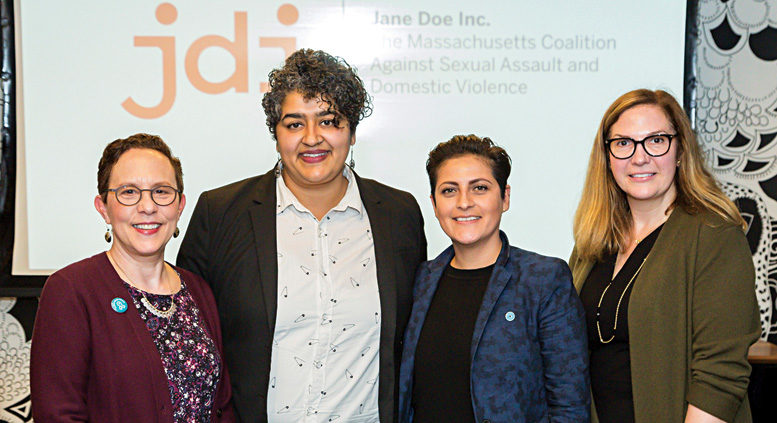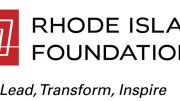Visionary Voice Award 2019 honors Hema Sarang-Sieminski
By: Audrey Cole/TRT Reporter—
BOSTON—Late April, Hema Sarang-Sieminski was honored with the Visionary Voice Award for their outstanding activism and legal advocacy on behalf of survivors of sexual violence and partner abuse, particularly within the LGBTQ and immigrant communities, according to the organization that presented the award.
“Throughout their career, Hema has brought focused, skilled and passionate leadership to uphold the dignity of all survivors and engage in the complex work that is required at the intersection of violence, trauma, and oppression,” said Debra J. Robbin, Executive Director of Jane Doe Inc., (JDI) the Massachusetts-based organization that nominated Sarang-Sieminski for the Visionary Voice Award. “We are proud to recognize Hema for her extraordinary advocacy on behalf of individuals, and also for her broader influence in promoting the understanding and incorporating of intersectionality throughout our field of work.”
Sarang-Sieminski, a senior attorney at the Victim Rights Law Center, has been working with survivors of partner abuse and sexual violence for nearly 20 years. Likewise, she has dedicated her life’s work to addressing the vast intersectionalities and subsequent oppression often faced by marginalized communities.
“I began my legal career as an immigration attorney for survivors because of the violence I saw being enacted by institutions that survivors were forced to navigate each and every day,” Sarang-Sieminski said. “Not only were survivors attempting to find safety from individuals who harmed them, they were also facing the challenges of oppression on so many fronts. This ranges from the fear [of] detention or removal by immigration authorities, to dealing with programs that express transphobia or don’t offer services in a survivor’s language of comfort, to the daily interpersonal white supremacy, anti-immigrant sentiment, misogyny, homo/bi/transphobia immigrant survivors endure. The journey to healing for survivors living at the intersections of oppression is a long and hard one. As a survivor, a queer person, a woman of color, an attorney, I knew I wanted my practice to be one that promoted healing through dismantling systems of oppression.”
Multi-layered realities
Robbin said that Sarang-Sieminski is having a broad reach in the field, bringing others into the fold of understanding individual and shared identities.
“To support individual survivors and entire communities and effectively prevent and end sexual and domestic violence requires that we consider the multi-layered realities of people’s lives,” Robbin said. “Hema does not shy away from the hard conversations and complex and complicated work that is required to work at the intersections of violence, trauma, and oppression. In addition to her advocacy for individuals, Hema is having an influence more broadly in terms of the fields work to incorporate an understanding of intersectionality into legal and social services advocacy.”
The Visionary Voice Award is presented by the National Sexual Violence Resource Center to recognize the creativity and hard work of individuals around the country who have demonstrated outstanding work to end sexual violence.
Sarang-Sieminski is also a member of the American Immigration Lawyers Association and a Steering Committee member of the MA Women of Color Network and the Massachusetts Transgender Political Coalition. They were recently named one of the LGBT Bar’s Best LGBT Lawyers Under 40.
Microaggressions
Fueled by the “resilience of these survivors and the power of our communities,” Sarang-Sieminski recognizes the challenges that are inherent to create change and rises to meet the needs of LGBTQ and immigrant survivors.
“There is so much work to be done to raise community awareness of the needs of LGBTQ survivors and immigrant survivors,” they said. “Survivorship is exhausting as it is. Surviving microaggressions and more overt aggressions that take place because of one’s LGBTQ identity, immigration status, race, HIV+ status take a toll and make it so much harder for survivors with intersecting marginalized identities to access services they need.”
Intersections of oppression
When the survivor is also a member of one or more oppressed groups, it limits the accessibility of resources that are needed to heal. But, Sarang-Sieminski said change is possible by taking the right steps.
“While it’s not easy for any survivor to heal from sexual assault or intimate partner violence, survivors living at the intersections of oppression often are placed in positions where they must educate, defend, or render invisible many facets of themselves to obtain the remedies they need,” the attorney explained. “As providers and community members, we can change this by supporting the leadership of survivors and people of color, by engaging in cultural humility, and asking how we can make our businesses, organizations, and institutions more accessible.”
However, societal constructs such as rape culture must be dismantled to end sexual violence.
According to Jane Doe Inc., “rape culture is a complex [set] of beliefs that encourages male sexual aggression and supports violence against women,” its website read. “It occurs in a society where violence is seen as sexy and sexuality as violent. In a rape culture, women perceive a continuum of threatened violence that ranges from sexual remarks to sexual touching to rape itself. A rape culture condones physical and emotional terrorism against women as the norm. In a rape culture, both men and women assume that sexual violence is a fact of life, inevitable as death or taxes. This violence, however, is neither biologically nor divinely ordained. Much of what we accept as inevitable is, in fact, the expression of values and attitudes that can change.”
Sarang-Sieminski said examples are all around us.
“It’s the victim-blaming we see each time a survivor discloses,” they said. “It’s the lack of resources available for sexual assault survivors. It’s judges or institutional stakeholders who still turn to a survivor’s clothing or behavior as a basis for discrediting them. It’s refusing to believe sexual assault is an issue in LGBTQ communities. It is the language we hear all too often of rape being used to “correct” someone’s sexual orientation, gender expression and/or identity.”
Believing and supporting survivors, Sarang-Sieminski says, is a critical step to dismantle rape culture at its core. Education is also key.
“We can believe survivors,” said the honoree. “We can acknowledge that gender-nonconforming youth are at far greater risk of sexual harm and center the experiences and needs of trans* and gender non-conforming survivors of color in the work we do. We can support survivors at our workplaces by acknowledging and mindfully accommodating the tremendous toll survivorship takes on our health, wellbeing, and spirit. We can talk about and model consent with our children from the time they can talk. We can teach our children what it means to have autonomy over our bodies and what to do or say when they see someone trying to take away that agency (whether directed at them or another person). We can learn what we can do to interrupt rape culture as bystanders.”
With regards to the immigrant population, including people that may be undocumented, Sarang-Sieminski offered specific advice and encouragement.
“If an immigrant is undocumented and experiencing abuse, they should know that 1. They are not alone; 2. Despite so many forces that may tell them otherwise, no one ‘deserves’ to be harmed; 3. Options for immigrant survivors do exist even in this anti-immigrant climate and; 4. Only they get to make decisions regarding whether, when, and how to access supportive services,” they said.
In Massachusetts, survivors can call SafeLink at 1-877-785-2020; TTY: 1-877-521-2601 or visit janedoe.org. For out-of-state survivors, they can seek assistance from the National Domestic Violence Hotline by calling 800-799-SAFE (800-799-7233), according to Sarang-Sieminski.
“From our unique vantage point as the only statewide coalition in Massachusetts focused on these issues, JDI can see who is doing extraordinary social justice work that often goes unsung,” said Robbin, of Sarang-Sieminski’s nomination.
To learn more about Jane Doe Inc.’s initiatives, legislative priorities, and training programs, visit janedoe.org.
NOTE: Sarang-Sieminski uses the pronouns she and they.







